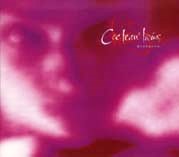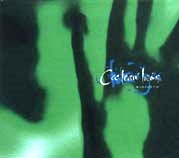
Violaine
Smile
Tranquil Eye
Green edition
Violaine
Circling Girl
Alice

Violaine - 1996
 |
Pink edition
Violaine Smile Tranquil Eye Green edition Violaine Circling Girl Alice |
 |
|
Several months after the release of Milk & Kisses the band released a further CD-single, featuring what many consider to be the best track of that album. Similarly to Tishbite there were two versions again, a pink one and a green one. These days both are out of print, but the four non-album tracks are available through the Lullabies To Violaine compilation. It is not quite certain whether any of the four additional track might have been recorded after the sessions for the Milk & Kisses album. If they were then they provide us with a glimpse of what might have been had the band not decided to break up shortly hereafter. |
|
Violaine At the time of release the band was probably unaware of the fact that Milk & Kisses was to be their last studio album. But even if they had known they couldn't possibly have written a better farewell track than the shattering Violaine, a pulsating rock effort of stunning class. It's all too easy to run out of superlatives for this fabulous track. How can you possibly describe such a magnificent effort? Even the first second with its two powerful bass notes vibrates with massive anticipation. Next a majestic guitar is played in the best tradition of such classics as Musette And Drums or Persephone. Then there are obvious stereo effects, with chords tumbling from left to right and back again. And that's just the intro. Things have hardly started and you're out of breath already. Enter Liz. Relatively gentle at first, ever more jubilant as the song progresses. Guitars march on relentlessly, cymbals are crashing, but nothing can stop her. Multiple overdubs mean you can hear her in several different styles, using quickfire vocals and long wails all at the same time. Things just can't possibly get better from here on, now can they? Oh yes they can. Liz suddenly takes a step back and we hear a majestic instrumental break. Resounding guitars rule at the peak of their powers, drums and cymbals join in as the track briefly turns into a hard rock party. But soon the sound dies down. Finished? Far from it. Liz takes over once more. Now she sounds sweet and innocent, tender and fragile. But she gains momentum as the guitars return, and the volume is turned up again until a final burst really concludes this song. It's also interesting to note how different Violaine sounds from their previous album Four-Calendar Café. And how the lyrics are totally inexplicable again - just as they used to be on any early Cocteau track. On the insert of the Milk & Kisses CD we find the odd text fragment, suggesting they occur in the lyrics somewhere, although it nowhere says so. Some of those fragments appear to be English words written backwards. It probably wouldn't be beyond Liz to sing phrases backwards, (which would definitely explain why noone understands a syllable of them) but only one person knows for sure... The band members themselves apparently loved this track as well. Violaine was released on an album and on CD-single in two different versions. The song features on the Lullabies To Violaine compilation and they also played an excellent rendition during their final BBC Session. And even before Milk & Kisses was released they recorded a very different version for their Otherness EP. Which means that Violaine appears on no less than six offical Cocteau Twins releases, more than any other track they ever created. Which is a fitting tribute to this truly epic track. |
|
Smile Never afraid to attempt the unexpected the Cocteau Twins selected two much softer songs to accompany Violaine on this CD-single. Of these Smile is easily the most lively one, featuring a quick and very constant rhythm from the very first bar up to the final notes. The rhythm may be infectious, the real quality of the song lies in the angel impersonation by Liz. Her vocals are floating effortlessly around the steady rhythm, lively and yet soothing, clear and yet soft. Line after line she manages to hold on to an atmosphere of heavenly beauty, never faltering, never even giving room to an instrumental break. It is an incredible vocal performance. One would expect such a rhythmic song to feature a steady bass. Surprisingly though the bass takes care of virtually all of the musical melodies. Whereas Robin was apparently happy to hide in the rhythm section this time Simon is delivering all kinds of interesting variations to complement Liz's light vocals. Painting a landscape of unreal fantasy Smile is a song that once again proves the cocteau Twins are the masters of 'ethereal' music. One feels it really deserves much better than to appear on a rare CD-single only. |
|
Tranquil Eye In a few words, Tranquil Eye is vocal beauty against a quiet background. There's more to it than that, of course - but not all that much, because the band kept things rather simple on this song. Or did they? Liz is the obvious star of this track, with two vocals beautifully singing against each other. There's no obvious chorus in this song - and mostly it's not even easy to detect a clearcut melody - well, who needs a melody with vocals this enchanting anyway? Still, even great vocals usually benefit from a nice background. Here, the band produce a wonderfully soft and subtle atmosphere to provide a tapestry for Liz to dance upon. The gentlest of guitars, keyboards, traces of soft percussion here and there, together they weave a magical atmosphere of intimacy and peaceful, well, tranquility of course. It's interesting to note how the band were looking for ever more complex mixtures and melodies on Blue Bell Knoll and Heaven Or Las Vegas. On later albums their work was often much more delicate. Here they seem to have taken this concept to the limit. And yet - on listening repeatedly to what seemed to be all so very straightforward doubt may well creep in. Everything on this song fits together so perfectly one wonders whether it really is all that simple, or whether the craftsmanship of the band makes Tranquil Eye appear to be such a simple song. |
|
Circling Girl During their final years the band gradually developed a style that was fairly filled with sound, though not particularly heavy. Circling Girl is probably a good example of this, since it has many features in common with many other tracks from this period. It's not really a loud song, but the sound level in Circling Girl remains constant throughout. Though not played particularly heavily the guitar is definitely dominating the song. Robin plays it with a flowing, continuous line all through rather than with separate chords, thus providing a varying but still ever present background. By weaving in a number of unexpected twists and turns he provides Liz with a very interesting musical landscape to perform against. Rhythmically the band use a very effective technique: a slower rhythm with a quicker three time embedded. The guitars and percussion follow the faster pace with the vocals taking the quieter route most of the time. It means that Liz can sing fairly relaxed and can apply her angel choir impression again. She also has to take care of the main melody all by herself though, and despite her efforts her main vocal melody isn't quite as convincing as the guitar parts. Circling Girl is still a pleasant enough song to listen to, and whatever qualities the main melody may lack is easily compensated by the inspired guitar effects. Circling Girl was originally released in a slightly different version on the Volume 15 collection album. |
|
Alice Ingenious vocal overdubs mingled with a variety of instruments played against a steady piano theme - together they weave a magical sound carpet called Alice. A piano, playing a deceptively simple yet ever so catchy little melody introduces the song. But it soon becomes very hard to tell exactly which instruments we hear as lots of them join in. Most of the time they all melt together in the kind of melodic tapestry so typical for this era. And it's such a rhythmic song that it may not be immediately obvious something quite remarkable is happening: in the best tradition of Victorialand the song is played without a single beat of percussion! As is so often the case with the band's later work this track is mainly about the vocals. Liz sings two rather different parts at fairly different pitches, but they complement each other beautifully. The chorus has another subtlety, as the song title is repeated five times within a rhythm of eight, but somehow it all fits in completely naturally. Although never released on a Cocteau album Alice is probably one of the finest examples of the band's 'wall of sound' type songs. Its rich sounds and creative melodies make this song a highlight of the band's final efforts. Alice was originally released on the Stealing Beauty Soundtrack. |